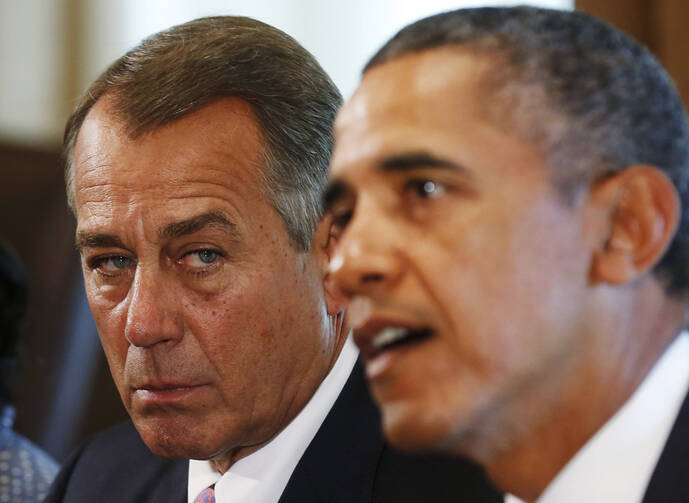Over the past week, there’s been a hardening consensus that the Republican majority in the U.S. House (with or without the blessing of Speaker John Boehner) will force a shutdown of the federal government as part of a last-ditch effort to stop implementation of “Obamacare” (the Affordable Care Act). ABC News reported on Sunday:
House Republicans, seeking to defund and delay implementation of the president’s signature health care law, have sought to use the upcoming debt ceiling and government funding fights to extract concessions from the White House.
[President Barack] Obama says he is drawing a line in the sand.
“What has never happened in the past was the notion that in exchange for fulfilling the full faith and credit of the United States, that we are wiping away let’s say major legislation like the health care bill,” he told [ABC News’s George] Stephanopoulos.
It’s hard to argue against the idea that this standoff is unprecedented. Whatever the result and whoever backs down first, a government shutdown (or, more drastically, a default on the national debt) will be worthy of mention in any U.S. history textbook. To a greater extent than the impeachment of President Bill Clinton in 1998, the GOP gambit can be seen as an attempt to overturn the result a presidential election, one that the party had hoped would give them a mandate for repealing Obama’s signature law. (This may not be an acceptable summation in history books to be used in Texas. Good luck to the unfortunates who will have to describe this mess in a neutral way for schoolkids.)
What’s more remarkable about this remarkable turn of events is that it may not significantly change the way that voters perceive the president or congressional leaders. At the Monkey Cage blog, Andrew Rudalevige (writing in the context of Obama’s policy toward Syria) notes the consistency in the president’s approval ratings and points to evidence that negative news coverage doesn’t have the effect it once had. Rudalevige summarizes the findings of Jeffrey Cohen in his 2008 book The Presidency in the Era of 24-Hour News:
… in the pre-Watergate era, the press coverage of the president, and of government generally, was largely positive. Thus, negative news was a credible signal for the public to follow. When a Harry Truman, or Richard Nixon, attracted negative coverage, people assumed this meant something had changed they needed to take note of. Now, pretty much all coverage of the president is negative, so the public uncouples its sense of presidential performance from news coverage.
No matter what happens with the federal budget and the debt ceiling, it’s hard to imagine many voters deciding that “something has changed” requiring a reassessment of Obama. The mainstream media hedges its bets by suggesting that any occupant of the Oval Office loses effectiveness and power over the long term—see the “second-term curse” that Politico laughingly reported that Obama thought he could “buck”—but this narrative has lost its potency with repetition (as has the narrative of legislative leaders who can’t control their chambers). At any rate, many voters now bypass the establishment media and, as Rudalevige points out, “shop” for news outlets that reinforce their existing views. And it would be a bad economic model for Fox to confuse viewers by suddenly taking Obama’s side, or for MSNBC to remove its Obama defenders from the air.
So Obama’s standing with the public is not likely to change dramatically during a budget standoff. What about the GOP House members in the hard-line conservative Tea Party movement?
They may be inadvertently helped by the meager and scattershot media coverage of individual members of Congress. As Seth Masket writes, “Extremists only get tossed out of office if voters know they’re extreme.” Masket is the co-author of a study that suggests that more partisan or ideologically rigid members of Congress have a tougher time getting re-elected if their districts more or less coincide with newspaper circulation areas and TV coverage areas:
That is, in perfectly congruent media markets and districts, everyone within a media market would be represented by the same member of Congress. In such a highly congruent situation, journalists have a strong incentive to cover that member of Congress’ daily activities, which has the effect of increasing voters’ knowledge of that member.
Unfortunately, many congressional districts are many-tentacled things (see some of the ugliest here) that stretch across multiple media markets. For example, the Texas 27th District, represented by Tea Party stalwart Blake Farenthold, starts in Corpus Christi but reaches up to take in suburbs of Austin and Houston. Will Austin and Houston media cover his role in any government shutdown when only a small percentage of their audience is in his district?
For people who closely follow politics, the next few weeks could be one of the most dramatic periods in American history. But there may be very little effect on the public esteem of the president or of the GOP-controlled House.
Photo of House Speaker John Boehner and President Barack Obama from Catholic News Service.








